Sports Card grading has been around since the early 1990’s but something that did not become much more popular till the late 1990’s before exploding after the COVID-19 pandemic. As sports card grading has blown up over the past few years, so has the entire sports card hobby. As sports card collectors turn to sports card grading, many questions have presented themselves such as which company is better PSA VS SGC or BGS VS PSA or BGS VS SGC.

In addition to those questions other popular questions are always asked when it comes to sports card grading including “what is sports card grading”, is it worth getting sports cards graded and even how much does it cost to have sports card graded. Luckily for you, we are here to help you learn more about sports card grading while taking a deeper look as both Professional Sports Authenticator (PSA) and Sportscard Guaranty Company (SGC) in our comprehensive PSA VS SGC Grading Guide.
If you have arrived at our site and our new to sports card grading, consider taking the time to look at our sports card beginners guide to help you get started. Lastly, before getting started always take the time to do your own research on the various sports card grading companies such as Becket Grading Services, SGC and PSA as well as new Artificial Intelligence (AI) grading companies and even newer companies making trends with the hobby including Certified Sports Guaranty (CSG) grading.
No further do, let’s look at PSA Grading vs SGC Grading and what sports card grading company to choose.
PSA VS SGC Grading Guide: What Sports Card Grading Company to Choose?
What is sports card grading?
It is simple to make a guess to answer the question what is sports card grading? Now before you say you are right, here is what sports card grading is. Sports card grading is a process, where sports card collectors and/or sports card hobby shops submit cards to various sports card grading companies such as PSA and SGC to name a few.
In return for a various fee based on the company, the company will encapsulate the card within a slab case and provide it a numerical value based on the company’s sports card grading scale (1-10). The card then is returned to the original submitter to add to their Personal Collection (PC) or to sell. To learn more about grading our Sports Card Grading Guide is also available.
Sports Card Grading Companies:
Like any other industry companies will always find a way to pop up and the same can be said for the sports card grading industry. However, while new companies enter the market, many of the same companies remain at the top including both PSA and SGC as well as BGS. In addition to those three companies, other companies including a newer company such CSG and AI sports card grading are slowly leaving their mark within the industry. New companies such as CSG have open up new debates over who is better BGS VS CSG or PSA VS CSG.
Is it worth getting sports cards graded?
Before we look at PSA VS SGC, one question that many new collectors ask is “is it worth getting sports cards graded?”. To answer the question truthfully the correct answer can be both yes and no depending on the individual who is submitting the cards, their expectations as well as what cards they are submitting to be graded.
For example, if you are submitting a random player that may not have high market appeal and the card is not a rookie card or low numbered card, it may not be worth grading that sports cards. However, if you are someone who likes to build graded sports sets with all cards in the set graded 10 or higher than 9, it would be worth it if you can’t find that specific card previously graded to meet your sports card grading criteria.
On the opposite side, if you have a rookie card or other card of high interest such as a low numbered parallel or insert, sports card grading is well worth the value while potentially increasing the value of your cards by hundreds of dollars if not thousands of dollars. For example below is a 2014 Mookie Betts Bowman Chrome PSA 10 VS Ungraded 2014 Mookie Betts Bowman Chrome:
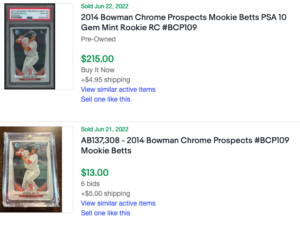
PSA VS SGC Grading Guide: Quick Look at PSA and SGC
As you look around the sports grading industry, many different companies will be found. However, currently at the front of the industry are only a handful of those companies to include both SGC and PSA. Both PSA and SGC have paved the way along with BGS in transforming the hobby of sports card collecting while also helping the sports card investing side of the hobby.
For SGC and PSA, both companies have been a key driven force within the sports card grading industry. In 1991, PSA entered the grading and authentication industry while continuing to being a leader into the early 2020’s. Since their start back in 1991, PSA as a company has graded over 40 million sports cards.
As PSA was continuing to build, and the Junk Wax ERA of sports cards were blowing up in the late 1990’s, a new company entered the industry by the name of Sportscard Guaranty Company (SGC) or what most refer to them as SGC in 1998. Since their start in 1998, SGC continues to be a leader in sports card grading including among vintage card collectors.
PSA VS SGC Grading Guide: Should you choose PSA or SGC for Sports Card Grading?
Like making a decision of BGS VS PSA, deciding on which sports card grading company you should choose between PSA VS SGC is extremely difficult. Each of these companies are leaders within the industry while both are respected within the hobby. However, when considering a sport grading company for your cards, you must consider various elements of the hobby that is key to sports card grading.
These elements of sports card grading include the Grading Scale, how much is to grade sports cards, the time frame to have your sports cards graded as well as what types of graded slabs and graded labels are being used. In addition, you should also take the time to see how similar cards have sold for that have been graded by both SGC and PSA. Here is a closer look at those elements for both PSA and SGC.
PSA VS SGC Grading Guide: Grading Scale
Most of the sports card grading companies offer very similar sports card grading scales that grade the individual cards on a 1-10 rating chart. While SGC once graded cards on a 0-100 scale, the company made the decision to move to the 1-10 grade scale in 2018. Despite offering a very similar 1-10 grading scale, the two companies have minor differences in their scale including, SGC half point grading marks for each value (1.5, 2.5, 3.5, etc.). In addition, SGC also offers a Gem 10 and a Pristine 10.
PSA Grading Scale
When you look at PSA grading scale, the company offers a standard 1-10 scale but with no 9.5. Here is the PSA Grading Scale:
Poor (PR 1)
Fair (FR 1.5)
Good (Good 2)
Very Good (VG 3)
Very Good-Excellent (VG-EX 4)
Excellent (EX 5)
Excellent-Mint (EX-MT 6)
Near Mint (NM 7)
Near Mint-Mint (NM-MT 8)
Mint (Mint 9)
Gem Mint (GEM-MT 10)
SGC Grading Scale
SGC uses the standard 1-10 sports card grading scale while incorporating half point designations for every card value (1.5, 2.5, 3.5, etc.). In addition, SGC offers two variations of a graded 10 sports card the Gem 10 and the Pristine 10. The difference between the Gem 10 and the Pristine 10 is that the pristine 10 is flawless with a centering score at 50/50 while the Gem 10 has a centering score of 55/45 or better. Here is the SGC Grading Scale:
Poor (1)
Fair (1.5)
Good (2)
Good+ (2.5)
VG (3)
VG+ (3.5)
VG/EX (4)
VG/EX+(4.5)
EX (5)
EX+ (5.5)
EX/NM (6)
Ex/NM+ (6.5)
NRMT (7)
NM+ (7.5)
NM/MT (8)
NM/MT+ (8.5)
Mint (9)
Mint+ (9.5)
GEM (10 GM)
Pristine (10 PRI)
Advantage: Tie (Unless you want a Pristine 10 for your collection)
PSA VS SGC Grading Guide: Grading Fees
How much does it cost to have sports card graded?
Another key element that can play a role in your sports card grading decision is how much it costs for PSA and SGC to grade your card. Higher fees equal lower profits if you are looking to sell your sports cards for a profit. Here is a look at PSA VS SGC Grading Fees:
PSA Grading Fees
Value (Value of card less than $499) $30
Economy (Value of card Less than $999) $50
Regular (Value of card less than $1499) $100
Express (Value of card less than $2499) $150
Super Express (Value of card less than $4999) $300
Walk Through (Value of card less than $9999) $600
Premium 1 (Value of card less than $24999) $1000
Premium 2 (Value of card less than $49999) $2000
Premium 3 (Value of card less than $99999) $3000
Premium 5 (Value of card less than $249999) $5000
Premium 10 (Value of card higher than $25000) $10000
SGC Grading Fees
Declared Value <$1,500 (20-25 EST Business Days) $30
Declared Value <$1,500 (10 EST Business Days) $40
Declared Value <$1,500 (5 EST Business Days) $75
Declared Value <$1,500 (1-2 EST Business Days) $125
Declared Value <$3,500 (5 EST Business Days) $85
Declared Value <$3,500 (1-2 EST Business Days) $125
Declared Value <$7,500 (1-2 EST Business Days) $250
Declared Value <$20,000 (1-2 EST Business Days) $500
Declared Value <$50,000 (1-2 EST Business Days) $1,000
Declared Value <$100,000 (1-2 EST Business Days) $2,000
Declared Value >$100,000 (1-2 EST Business Days) $3,750***
*** For each additional $10,000 over $100,000, an additional $375 is added to the base fee.
Advantage: SGC for both lower graded cards and more expensive graded cards
PSA VS SGC Grading Guide: Grading Time Frame
PSA Turnaround Times
Value 120 Business Days
Economy 90 Business Days
Regular 60 Business Days
Express 30 Business Days
Super Express 14 Business Days
Walk-Through 7 Business Days
Premium + 3 Business Days
*All turnaround times are estimated.
SGC Turnaround Times
<$1,500 20-25 Business Days
<$1,500 10 Business Days
<$1,500 5 Business Days
<$1,500 1-2 Business Days
<$3,500 5 Business Days
<$3,500 1-2 Business Days
<$7,500 1-2 Business Days
<$20,000 1-2 Business Days
<$50,000 1-2 Business Days
<$100,000 1-2 Business Days
>$100,000 1-2 Business Days
*All turnaround times are estimated. In addition, SGC only offers longer and cheaper options to cards valued less than $1,500 (up to 25 days) and $3,500 (up to five business days).
Advantage: PUSH based on what cards you are having graded.
PSA VS SGC Grading Guide: Graded Slabs & Graded Labels
One last element that you might consider when looking at sports card grading companies is the quality of the slab and the graded label within the encapsulated card. With graded card slabs, they are tamper proof while providing extra protection to the card. The graded label is the label applied to the case that features the numerical sports card graded value.
Here is a look at the various card graded labels used by PSA and SGC.
PSA Original Label
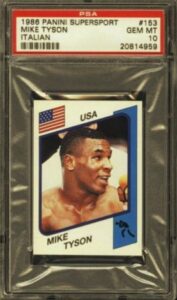
PSA New Hologram Label
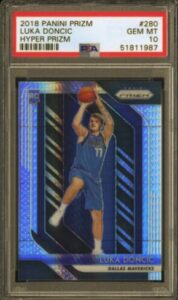
PSA Reverse Side Label
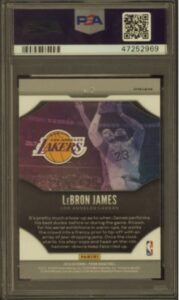
SGC Original Label (10-100)

SGC New Label (1-10)
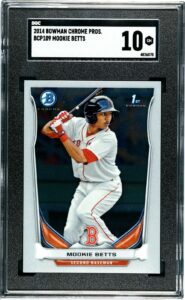
Advantage: PSA gets the nod based on the added security measure to prevent counterfeit labels.
PSA VS SGC Grading Guide: Comparing eBay Sales
Lastly and possible the most important element of the entire grading process of sports cards, is which graded cards return the highest sale values. When looking at PSA VS SGC, a decision on which company to choose may come down to potential resale value of the card being graded.
Here is a look at some eBAY Sales Comps for PSA VS SGC:
Mookie Betts 2014 Bowman Chrome (PSA 10 VS SGC 10)
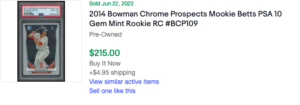
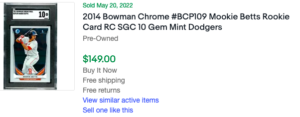
Advantage: PSA
In closing both PSA and SGC are great grading companies for sports cards. However, you must take the time to research both companies based on the card or cards you are looking to have graded. As you see above, a PSA 10 2014 Bowman Chrome Mookie Betts outsold a SGC 10 2014 Bowman Chrome Mookie Betts by $66 dollars. Now depending on the grading service used and time frame you want the card returned by, PSA produced a higher investment value on the sports card investment.
Our slight nod leans to PSA based on the added security metrics added to the graded label as well as the potential resale values associated with PSA graded sports cards VS SGC graded sports cards.
[ Grade your cards with AI in real-time >> https://bit.ly/3SMSfxV ]




5 Comments